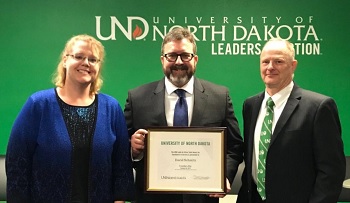Rural Round-up: Targeted Rural Health Education
Kamille S Sherman, MD FAAFP is co-director of Family Medicine Clerkship and Rural Opportunities in Medical Education in the Department of Family and Community Medicine, at the University of North Dakota School of Medicine and Health Sciences, USA. Here, Kamille describes a program of student-led writing to address a local health concern: Targeted Rural Health Education (TRHE).
Patient education does not need to be enclosed within the walls of a medical facility. Instead, reaching community members in their homes through a mechanism as basic as a newspaper can impact health of communities.

At the University of North Dakota School of Medicine and Health Sciences (UND SMHS), medical students and residents are offered opportunities to publish a newspaper article that addresses a healthcare concern in a rural community. This is modeled after a similar project done by the Idaho Family Medicine Residency program. There are Community Needs Assessments that identify local health concerns, or, the student can work with a local physician preceptor to identify a community health need and then write an article about that topic.
Photo (l to r): Kamille Sherman with Dave Schmitz, and Bryan Delage, - Sherman and Delage are Co- Directors for the Family Medicine Clerkship and the Rural Opportunities in Medical Education program. This photo is from University of North Dakota "Founder's Day" banquet in February 2019, where Dave Schmitz (who is well known in ruralWONCA) received recognition for his work in Outstanding Faculty Development.
The Center for Rural Health (CRH) at University of North Dakota and the North Dakota Rural Health Association work with the Department of Family and Community to assist in the writing and publication of the articles. A physician writing expert in the Center for Rural Health assists the student at all junctures of the writing process, from the initial draft until final publication, including working with newspaper publishers across the region to get the article submitted for publication.
Most local, rural papers welcome the articles and feature them in the “Health” or “Community” sections. There is no honorarium provided to the student, but the ability to make a difference and raise awareness of a health concern in a community brings some satisfaction to the student and enhances ties of the University of North Dakota SMHS and Center for Rural Health across the region.
Articles published have a broad range of topics, ranging from farm safety practices to technology/telehealth enhancing the health of communities. This continues to be promoted to students during their experiences in Family Medicine training and is especially emphasized to students who are completing portions of their training in rural communities across the region.
Utilizing various forms of social media to reach the general public is a tool we can continually improve. The use of TRHE to enhance the health of rural North Dakotans is a novel approach to community education.
Extensive information on this project can be assessed
here.